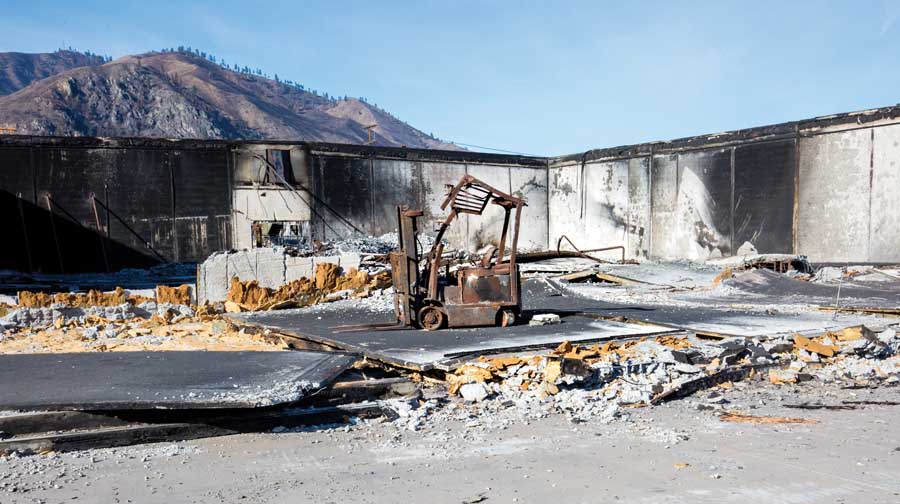
One of Chelan Fruit’s facilities along Howser Road in Chelan, Washington, on September 23, 2015, after it was lost in an August wildfire. While the co-op lost around $60 million in building and equipment, it was able to rent additional storage to handle all of its fruit from the 300 growers it serves. Chelan Fruit is already looking at new technologies—with particular focus on robotics—as it rebuilds. (TJ Mullinax/Good Fruit Grower)
One of the oldest grower cooperatives in central Washington, Blue Bird, Inc., began packing cherries on a new $10 million cherry line May 28.
One month later, that line and another dedicated to packing organic apples and pears were rubble, destroyed by a wildfire that unexpectedly raged into the Wenatchee city limits.
In Washington State alone, wildfires destroyed or damaged several warehouses and businesses; dozens of homes were lost; three firefighters died and four were injured in one blaze.
The full scope of the damage to the fruit industry is still being determined. But fall brought cooler temperatures and cleared smoke from the Northwest, and rebuilding is well underway.
Firefighters saved Blue Bird’s storage warehouses, which are being repaired of minor smoke and water damage. By spring, a new warehouse with the latest high-tech advancements in packing will join the fold.
About an hour to the north in Chelan, Washington, Chelan Fruit Cooperative is researching new technologies to rebuild its operations at Plant No. 1, which included a presizing line and two apple packing lines, controlled atmosphere storage, and conventional storage, after it was lost to a wildfire in August.
Both grower cooperatives are also looking into structural improvements to ensure their facilities are better prepared to withstand future wildfires—something that, in the past, might have been less of a consideration.
A wildfire downtown?
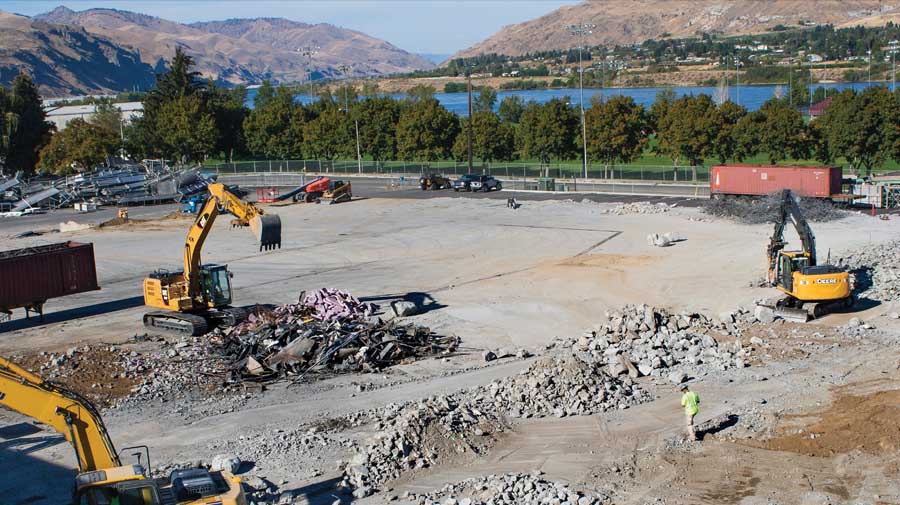
Workers break up concrete from a Blue Bird Inc. warehouse that was destroyed by a wildfire to prepare the site for construction in Wenatchee, Washington on September 9, 2015. (Shannon Dininny/Good Fruit Grower)
Blue Bird President Ron Gonsalves got the call at home at 9 p.m. Sunday, June 28: Fire officials were at the co-op’s Wenatchee plant with orders to evacuate the 300 workers packing cherries on the new line.
The wildfire that had started on a hillside on the outskirts of town sent embers into downtown Wenatchee, igniting apple-packing materials at Michelsen Packaging Company near Blue Bird’s warehouse.
Gonsalves jumped into his rig for the 20-minute drive into Wenatchee. By the time he arrived, agricultural supplier Northwest Wholesale, Inc., and a Stemilt Growers warehouse were ablaze. The Blue Bird warehouse caught fire from flying debris at 11:15 p.m.
“If I had been asked to write a list of 100 bad things that could happen, a fire in Wenatchee would not have made the list,” Gonsalves said.
In addition to the cherry line (a joint venture between Blue Bird and Monson Fruit of Selah, Washington), Blue Bird lost a dedicated organic line of 15 years and 75,000 cartons of packed fruit. Firefighters saved the storage warehouses, including rack storage and a 12-room CA storage building.
The harvest continued. In the immediate aftermath, several warehouses offered to receive fruit from Blue Bird’s 180 growers, as the co-op transferred key workers and production to its Peshastin facility. Three dedicated lines there operated double shifts through the fall.
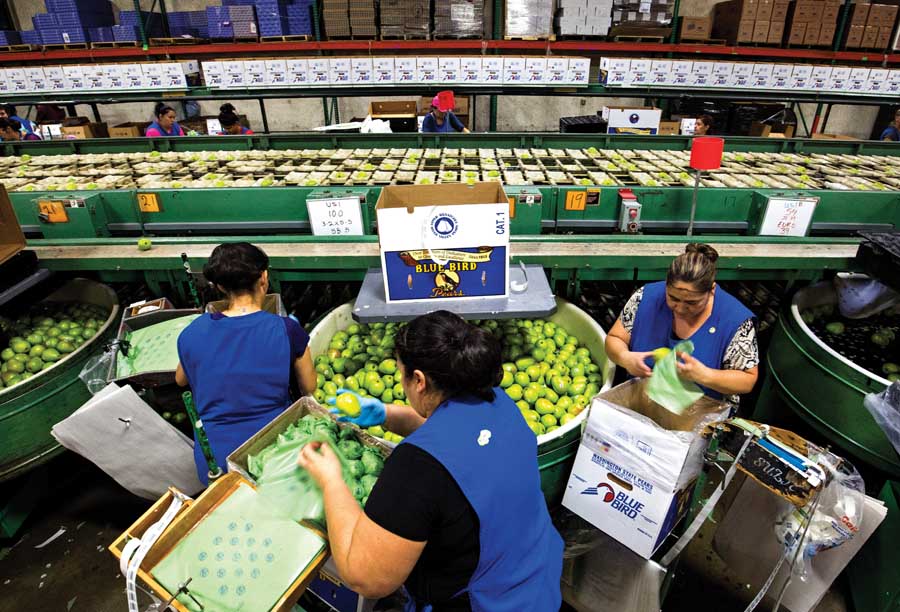
The Blue Bird packing facility in Peshastin, Washington, runs two eight-hour shifts for about four weeks during harvest, says operations manager Bruce Parkins. Following a fire that destroyed a Blue Bird facility in Wenatchee he expected the three lines in Peshastin to be operating double shifts for several months. (TJ Mullinax/Good Fruit Grower)
“Our friends in the industry were invaluable,” Gonsalves said. “We had a lot of concern from our growers, but also a lot of cooperation from growers and the industry to keep the harvest going.”
Insurance
Blue Bird had recently re-evaluated its insurance with installation of the new cherry line, which Gonsalves noted was key to the co-op’s quick recovery.
Blue Bird hired a third-party appraiser to evaluate its facilities and level of insurance coverage. Ultimately the co-op carried an umbrella policy for the Wenatchee property, plant, and equipment with an $85 million limit. Losses were only around $40 million with the remaining buildings saved from the fire.
The fruit business is complex, with many moving parts and high risk. Analyzing the risk, crop size, and expected market price make valuing fruit difficult. It’s also a perishable product, so a disaster—whether it’s man-made or natural—poses added concerns, said Doug Darlington, partner at MCM, an insurance brokerage firm based in Seattle.
It’s paramount to get updated valuations, he said. Too often, producers and packers add to their portfolios quickly and don’t update their values, particularly at the busiest time of year—summer—that is also a prime time for wildfires.
“It’s important to re-evaluate your value and exposure regularly. Nobody wants to think about paying excessive insurance charges, but the ability to recover from a major loss is totally dependent on the adequacy of your coverage,” he said. “And like any homeowner, you’d better have limits to support the value you want to replace.”
An insurance broker should have industry knowledge and an agricultural background and talk with you annually about having the right insurance for your business, at the right time, Darlington said. “You might not insure four-wheelers for your property, because there might be 60 or 70 of them scattered around 20 different ranches. But if they’re all in one given location in the winter, in one garage, it might be worth covering.”
(Related story: Help to salvage burned land.)
Chelan Fruit
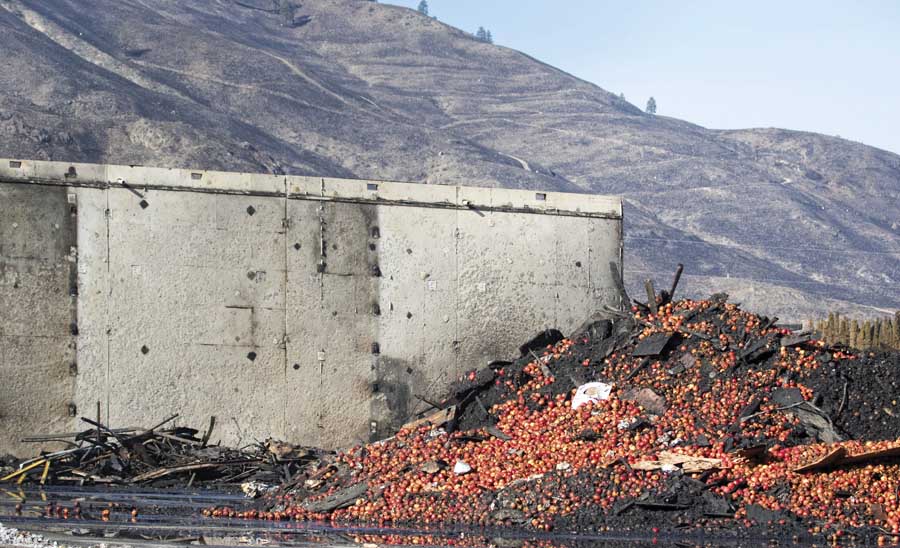
The Chelan complex fire burned a path of destruction through the community, scorching hillsides and packing, and warehouse facilities in east Chelan, Washington. (TJ Mullinax/Good Fruit Grower)
Chelan Fruit lost around $60 million worth of buildings and equipment—a presizing line with a capacity of 100,000 bins and two packaging lines with a capacity of 150,000 bins each season—as well as about $35 million worth of packed inventory and rolling stock, Chief Executive Officer Reggie Collins said.
The co-op that serves 300 growers was adequately insured, he said, and rented storage from nearby competitors.
“We’ve got the fruit, we can take all of it,” he said. “Thank goodness it wasn’t a record crop like last year.”
Planning for a fresh start
Continued industry growth definitely factors into rebuilding considerations. In addition to record cherry and apple crops in 2014, with general industry consensus that those records may mark a new baseline, organic production also continues to increase.
Blue Bird itself owns 750 acres of pears and apples, 75 percent of which are certified organic. All will be certified organic by 2017.
“Our intention is to satisfy our continued growth and take advantage of the fact that we are able to build a whole new building,” Gonsalves said. “Organic, we have a big crop coming on next year, so we need to get everyone on line to handle the cherry crop by June 1 and the new apple crop by August 15.”
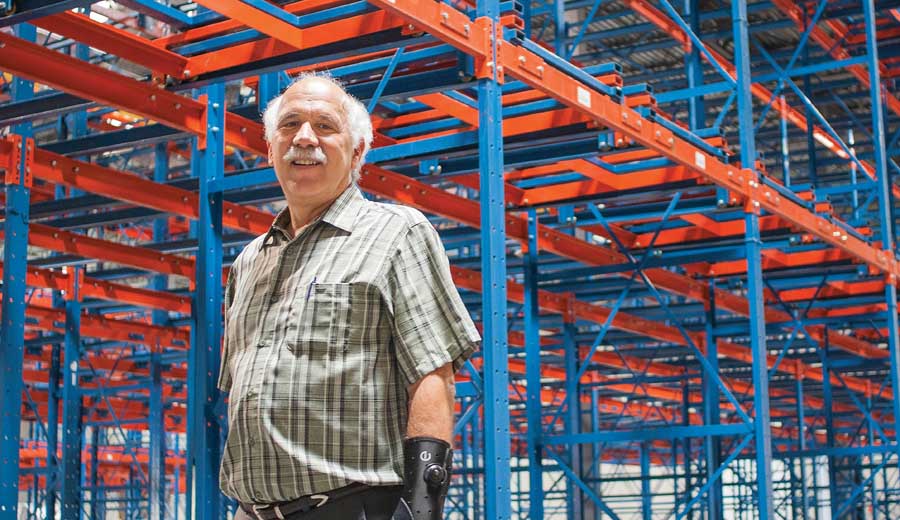
Ron Gonsalves, Blue Bird President, stands amid the rack storage of a warehouse that survived a wildfire in Wenatchee, Washington. (Shannon Dininny/Good Fruit Grower)
Blue Bird never questioned rebuilding. The co-op invested $4.5 million in storage at the Wenatchee site in 2011.
The new building will be slightly larger, with similar dimensions and layout, but some rearranging of entrances and the addition of more natural light. Both the cherry and apple lines will be larger to reflect the projected industry growth.
Collins said Chelan Fruit representatives will travel to Europe to see its latest technologies in presizing and packing equipment, with particular focus on robotics.
“Labor is tough up here. We’ll always have plenty of jobs for the people we can find, but we’ve got to look at some new robotic systems,” he said.
“We didn’t have any indications or plans in the short-term to replace those lines. They were very adequate for what we need until the next generation comes along,” he said. “We’re taking this as an opportunity to see who has the best and what’s the best way to handle these standard varieties that we have today, as well as the new varieties that are coming along.”
Food safety precautions also factor into the rebuilding for both cooperatives – everything from the elevation of the equipment to the manufacturing material and ability to replace or sanitize brushes and lines.
“We want to make sure we’re doing everything we can to upgrade anything we’ve lost,” Collins said.
Fire prevention
No one wants to pretend the unthinkable can’t happen again. Chelan Fruit and Blue Bird are looking at making changes to the roofs for better fire protection, as well as the latest sprinkler systems and alarms.
Gonsalves said he believes the Blue Bird warehouse might have been saved had there been more water lines on the roof. For that reason, the co-op plans to install water lines on the roof that are tied to the sprinkler system, with multiple stations in case of fire.
“After the fire this summer, I think everybody has to be aware of the potential. The last two summers have really brought that home,” he said. “Industry wide, we all need to be sensitive to our surroundings.”
Collins echoed that assessment. “We’ve been here since 1920, and it’s the first time we’ve seen this happen,” he said. “But that doesn’t mean it can’t repeat itself.” •
– by Shannon Dininny






Leave A Comment